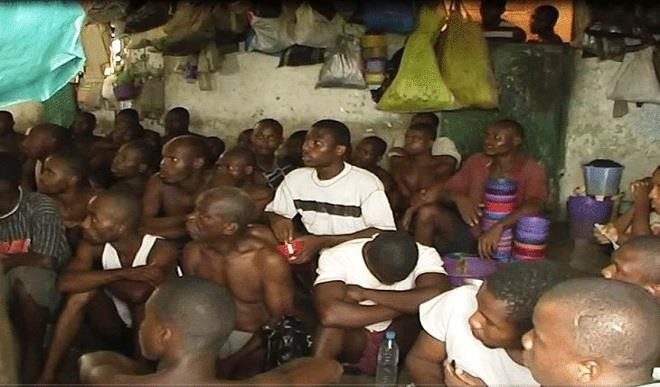How Law groups seek to end criminalisation of poverty
It was 02:30pm on Saturday, April 27, in front of the Lagos High Court premises, Igbosere, a young hawker was selling mangoes to earn a living when the Lagos State environmental agency’s Black Maria stopped and personnel of the agency bundled her and her wares straight to the Ikoyi Prison. Her offence: petty trading. And […]

It was 02:30pm on Saturday, April 27, in front of the Lagos High Court premises, Igbosere, a young hawker was selling mangoes to earn a living when the Lagos State environmental agency’s Black Maria stopped and personnel of the agency bundled her and her wares straight to the Ikoyi Prison.
Her offence: petty trading. And it will cost her about N15, 000 to regain freedom. She is just one out of the hundreds of awaiting trial inmates that are daily detained at the Ikoyi Prison and other prisons nationwide.
It was in anticipation of such instances that the Open Society Initiative of West Africa (OSIWA) and the Prisoners’ Rehabilitation and Welfare Action (PRAWA) launched a material with the theme: “Baseline Report on Decriminalisation and Declassification of Petty Offences”, which took place at the Lagos City Hotel, Ikeja, on Friday, April 26. States in particular reference are the FCT, Lagos, Abia, Enugu and Kano.
According to the Chief Judge of the FCT High Court, Justice Ishaq Bello, the criminal justice system in many African countries, including Nigeria, seems to have a common denominator; which is widespread criminalisation and punishment of petty offences.
He said this led to arbitrary arrests and detention, thus encouraging the violation of human rights and fundamental freedom of especially the poor, marginalised and vulnerable people.
Petty offences in Nigeria are loitering, wandering, inappropriate dressing/ behaviour, common nuisance, alms begging, prostitution, traffic-related offences, being a vagabond, among so many others.
It was gathered that there are several laws for people’s protection such as anti-torture law, but most people are not aware. So how do they appropriate the laws. They are usually under 30 years and termed vulnerable. Among them are graduates. On the average, they make monthly income of less than N10,000, some above N25,000, but they can be fined N5,000 at a sitting.
According to the African Commission on Human and Peoples Rights (ACHPR), this amounts to nothing more than the criminalisation of poverty, homelessness and unemployment and that their continued enforcement is disproportionately experienced by the poor and marginalised population.
Prison authorities believe that the enforcement of such laws contribute to the increasing number of people in awaiting-trial detention and consequently adds to the already overcrowded prisons, with negative consequences for detainees and adverse socio-economic impact on their families.
“It is the people down the ladder in life that are on the streets hawking and sustaining injuries when they are chased by task force. When we do our part, we could make their lives better than what it is today,” Grace Nsor, Director of International Operations, National Headquarters of the Legal Aid Council of Nigeria (LACON), said.
Jude Ilo of the Nigeria Country Office of OSIWA said, “The law should be able to provide protection for the weakest of us just the way it provides for the strongest. The cost of enforcing these laws is really high. Unduly and unnecessarily picking people up for random offences, taking them to court and feeding them doesn’t make any economic sense. We need to factor these into our criminal justice system.”
Grace Igyo, Director of Legal services, National Secretariat of the Nigerian Bar Association (NBA), said “We need to give justice a human face; to find a way of treating petty traders humanly.”
An Associate Professor of Criminology, Department of Sociology, Bayero University, Kano (BUK), Dr. Bello Ibrahim, believes that “criminalisation of petty offences creates criminals and destroys the future of a young person.”
According Tunde Ladipo, Assistant Comptroller General of Prisons in charge of welfare, “The society should not criminalise every infraction by members of the community. Adequate alternatives should be put in place to ensure that the criminal justice system provides for a free and humane society.
The Executive Director, Prison Fellowship of Nigeria, Benson Iwuagwu, said that in this matter, Lagos was in the black book.
“A sore in Lagos is to turn every government agency into revenue generation by criminalising poverty. Who made us poor? It is the government; no one wants to be poor,” he said.
Some lawyers said the legislature should be considered and that some of the so-called petty traders used it as cover up.
“No fewer than three environmental officers have been lost this year alone,” an environmental officer said.
He added that they daily received petitions against hoodlums, prostitutes and okada riders, and therefore asked, “As a law enforcement officer, would you fold your arms?”
LACON, which was represented by Mrs. Salawu, said there were no two ways about it because those who had no business in prison should not be there.
